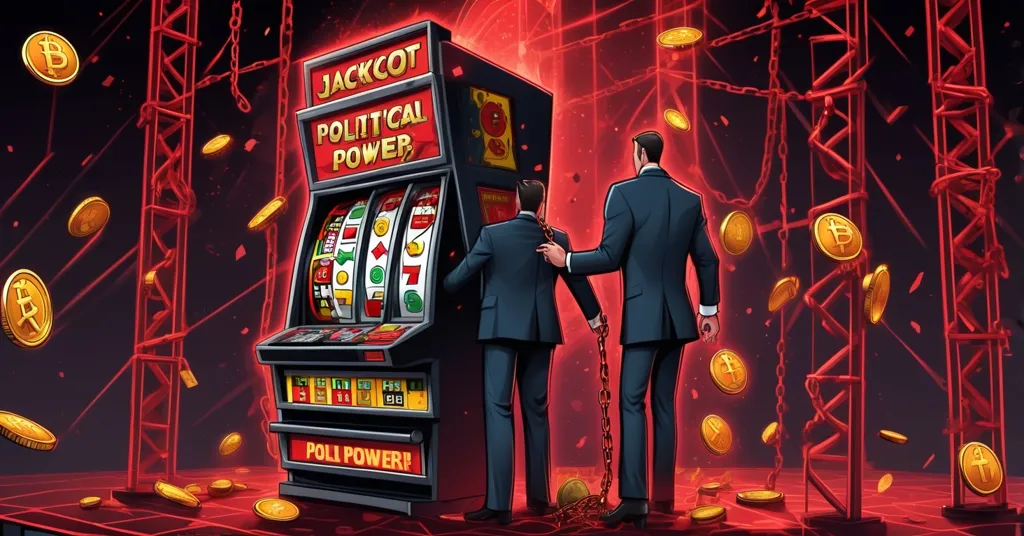Crypto’s $200M Bet on Trump’s MAGA Inc.: Freedom Push or Political Pitfall?

Crypto Cash Pours into Trump’s MAGA Inc.: A $200 Million Gamble on Freedom or Folly?
MAGA Inc., the flagship super PAC championing US President Donald Trump, has racked up a jaw-dropping $200 million in funding, with a massive chunk coming directly from the cryptocurrency industry. Heavyweight donors like Elon Musk, the Winklevoss twins, and companies such as BTC Inc, BitGo Inc, and Gemini Trust Company are bankrolling this political powerhouse ahead of the 2026 midterms, signaling a tight-knit alliance between Trump and the crypto world hungry for regulatory relief and a decentralized future.
- Funding Surge: MAGA Inc. secures $200 million, fueled by major crypto industry contributions.
- Big Names: Elon Musk, Winklevoss twins, BTC Inc, BitGo Inc, and Gemini Trust lead donations.
- Policy Play: Crypto sector bets on Trump’s promises for a US as the “Crypto Capital of the World.”
Crypto’s $200 Million Power Move: Buying Influence?
The numbers coming out of MAGA Inc. are staggering. With cash reserves confirmed at around $200 million—some reports pegging it at $196 million by mid-year—this super PAC towers over other Republican fundraising machines. For those new to the political game, a super PAC, or political action committee, can raise unlimited funds to influence elections but is barred from directly coordinating with candidates. The crypto industry’s fingerprints are all over this haul, with additional players like Foris DAX Inc. (behind Crypto.com) dropping $10 million, Blockchain.com pitching in $5 million, and tech moguls Marc Andreessen and Ben Horowitz of Andreessen Horowitz joining the fray. This isn’t loose change; it’s a deliberate push by a sector fed up with regulatory quicksand in the US, wrestling with issues like token classification—whether digital assets are securities or commodities—and oversight of stablecoins and DeFi (decentralized finance). If you’re just getting into crypto, DeFi means financial systems built on blockchain tech that cut out middlemen like banks, often landing in hot water with regulators over compliance.
Historically, crypto has been a punching bag for federal agencies like the SEC (Securities and Exchange Commission), with companies like Coinbase and Ripple locked in bitter legal battles over vague rules. This $200 million war chest isn’t just support for Trump—it’s a megaphone for an industry desperate to rewrite the rulebook. But here’s the rub: will this cash actually amplify crypto’s voice, or get lost in the noise of broader political agendas? Past lobbying efforts show mixed results, and there’s no guarantee this bet pays off.
Trump’s Crypto Crusade: Visionary or Veneer?
Trump has thrown his weight behind digital assets with gusto, branding himself as the defender of innovation against what he calls stifling federal overreach. His rallying cry to make the United States the “Crypto Capital of the World” has electrified a community aching for clarity and freedom to build.
“Trump has been increasingly vocal about his support for cryptocurrencies, positioning himself as a defender of innovation against what he perceives as overregulation from federal agencies.”
“His statements about making the United States the ‘Crypto Capital of the World’ have resonated within the industry, which continues to seek clearer regulatory frameworks and support for blockchain technology.”
Recent signals from his administration bolster this stance. A proposed crypto policy roadmap hints at streamlined regulations, lighter KYC/AML (Know Your Customer/Anti-Money Laundering) burdens for exchanges, and even integrating DeFi into mainstream finance. Whispers of a US Bitcoin reserve—a government-held stash of BTC as a strategic asset—have Bitcoin maximalists salivating at the prospect of state-level validation. For the uninitiated, Bitcoin maximalists see BTC as the ultimate decentralized currency, often dismissing altcoins as distractions. A reserve could cement Bitcoin’s status as a global store of value, rivaling gold. But let’s pump the brakes—details are scarce, with officials only teasing updates “in short order.” Is this a genuine pivot toward a decentralized future, or just political theater to woo donors? The jury’s out, and skepticism is warranted given the gap between promises and policy.
On the flip side, if Trump delivers even half of what he’s teased, it could be a game-changer. Easing regulatory chokeholds could unleash innovation, letting Ethereum’s DeFi protocols or niche altcoins fill gaps Bitcoin doesn’t touch. As a Bitcoin-leaning outlet, we champion BTC’s purity as peer-to-peer money, but we can’t ignore that altcoins often drive experimentation—think smart contracts or scalable micropayments—that BTC isn’t built for. A balanced US policy could nurture both, fostering a broader financial revolution.
Dirty Laundry: Trump’s Crypto Empire and Conflicts of Interest
But the plot thickens when you dig into Trump’s personal stakes. Federal disclosures reveal he’s earned a staggering $57.3 million from World Liberty Financial, a crypto venture linked to a stablecoin project. Toss in a Bitcoin mining firm, a meme coin called $TRUMP, and a $2 billion Bitcoin investment through Trump Media, and you’ve got a textbook conflict of interest. Critics aren’t holding back. Tony Carrk, executive director of progressive watchdog Accountable.US, slammed Trump’s crypto roadmap as a “self-aggrandizing industry wishlist” meant to pad his own pockets rather than safeguard American investors.
Democrats and ethics groups are raising hell over how much Trump stands to gain from any pro-crypto policies he champions. This isn’t just politics—it’s a potential scam wrapped in blockchain hype. For an industry already dodging the “Wild West” label, hitching its wagon to this baggage could blow up in its face. If you’re a hodler betting on regulatory relief, ask yourself: is this alliance pushing for your freedom, or just lining someone else’s wallet?
Yet, there’s a devil’s advocate angle here. Trump’s personal skin in the game could align his interests with the crypto sector’s, making him a fiercer advocate for policies that boost Bitcoin or stabilize altcoins. A vested interest might mean he fights harder for deregulation—though the ethical stench remains. It’s a messy trade-off, and one the community needs to wrestle with.
Competing Agendas: Crypto vs. Big Energy and Beyond
Zooming out, crypto isn’t the only heavyweight at MAGA Inc.’s donor table. Energy giants like Energy Transfer have shelled out $25 million, while healthcare titans like UnitedHealthCare added $5 million. This mix of backers means crypto’s slice of influence might get drowned out by louder, deeper-pocketed interests. If you’re banking on this $200 million to deliver a Bitcoin-friendly Congress, you might find your voice sidelined by oil barons or insurance moguls. MAGA Inc.’s past spending doesn’t inspire confidence either—recent moves targeted Rep. Thomas Massie over unrelated domestic and foreign policy spats, not crypto agendas. If your hard-earned donations are funding political vendettas instead of policy wins, that’s a gut punch.
Global Ripples: US Crypto Policy as a Domino Effect
Beyond US borders, this crypto-political handshake could send shockwaves. If Trump’s vision for a Bitcoin reserve or lighter regulations takes hold, it might embolden nations like El Salvador—already a Bitcoin pioneer—to double down on adoption. Conversely, it could spook tighter regulatory blocs like the EU into clamping down harder, fearing a US-led crypto boom. Analysts at Kanalcoin suggest this trend of political engagement could reshape global market dynamics, with institutional and governmental buy-in driving broader shifts. For decentralization advocates, a US pivot could be a beacon for freedom, proving blockchain’s power to disrupt centralized control. But if it flops or fuels cronyism, it risks painting crypto as just another political pawn. The stakes couldn’t be higher.
Market Shakes and Political Quakes: A Volatile Mix
Meanwhile, the crypto market itself isn’t exactly a bastion of calm. A recent 6.27% correction dragged the total market cap to $3.65 trillion from a peak near $3.93 trillion, just shy of 2021’s record highs. For newcomers, market cap is the total value of all cryptocurrencies in circulation—a snapshot of the sector’s health. Despite the dip, the trend remains bullish with higher highs and lows since April. But volatility is crypto’s bread and butter, and political uncertainty only cranks up the heat. If you’ve got BTC or ETH in your wallet, these political games could spell feast or famine for your holdings. Policy wins might stabilize prices or spark a rally toward $4 trillion; policy flops—or worse, scandals—could tank confidence faster than a rug pull. And let’s be clear: don’t fall for shills promising $100K Bitcoin by 2026 off the back of Trump’s rhetoric. Politics is a gamble, not a crystal ball.
Expert takes are a mixed bag. James Butterfill of CoinShares calls Trump’s roadmap “highly ambitious and ideologically clear,” a rare nod to digital assets from a major political figure. But he warns success hinges on bipartisan support and balancing innovation with integrity—a tall order in a polarized swamp. The bottom line? Hope is fine, but blind faith is foolish.
High Stakes, Higher Risks: What’s Crypto Really Buying?
So, what are we left with? Crypto’s $200 million bet on MAGA Inc. is a bold, ballsy move, rooted in a thirst for regulatory clarity and a belief in Trump’s decentralized dreams. For Bitcoin diehards, it’s a shot at mainstream legitimacy; for altcoin innovators, it’s a chance to carve out space for DeFi and beyond. But the path is riddled with traps—misallocated funds, ethical quagmires, and competing donor agendas could derail the whole damn thing. As blockchain fights for a seat at the table, this alliance could forge a future of financial freedom or shackle the industry to political quicksand. Are we on the cusp of a decentralized revolution, or just funding the next big circus? Time’s the only judge.
Key Takeaways and Questions
- What could crypto donations to MAGA Inc. mean for US policy?
The $200 million haul showcases strong industry backing for Trump, but there’s no certainty it will drive pro-crypto laws or support for 2026 midterm candidates, especially with past focus on presidential races. - Why is the crypto industry rallying behind Donald Trump?
Trump’s vow to make the US the “Crypto Capital of the World” and push back against federal overreach hits home for a sector craving clear, innovation-friendly regulations. - Does Trump’s personal crypto involvement raise red flags?
Hell yes—his $57.3 million from World Liberty Financial and ties to ventures like the $TRUMP memecoin scream conflict of interest, potentially prioritizing self-gain over public good. - How does market volatility connect to these political bets?
With a 6.27% drop to $3.65 trillion, the crypto market’s ups and downs could be swayed by policy outcomes, making this political investment a risky play for stability and growth. - Will MAGA Inc. back pro-crypto candidates in 2026?
Skepticism runs high—historical patterns of hoarding funds for presidential campaigns and spending on unrelated fights leave donors questioning the real impact of their contributions. - Could US crypto policy shifts affect global markets?
Absolutely, a US Bitcoin reserve or deregulation could inspire adoption elsewhere or trigger tighter controls in regions like the EU, reshaping the global blockchain landscape.



